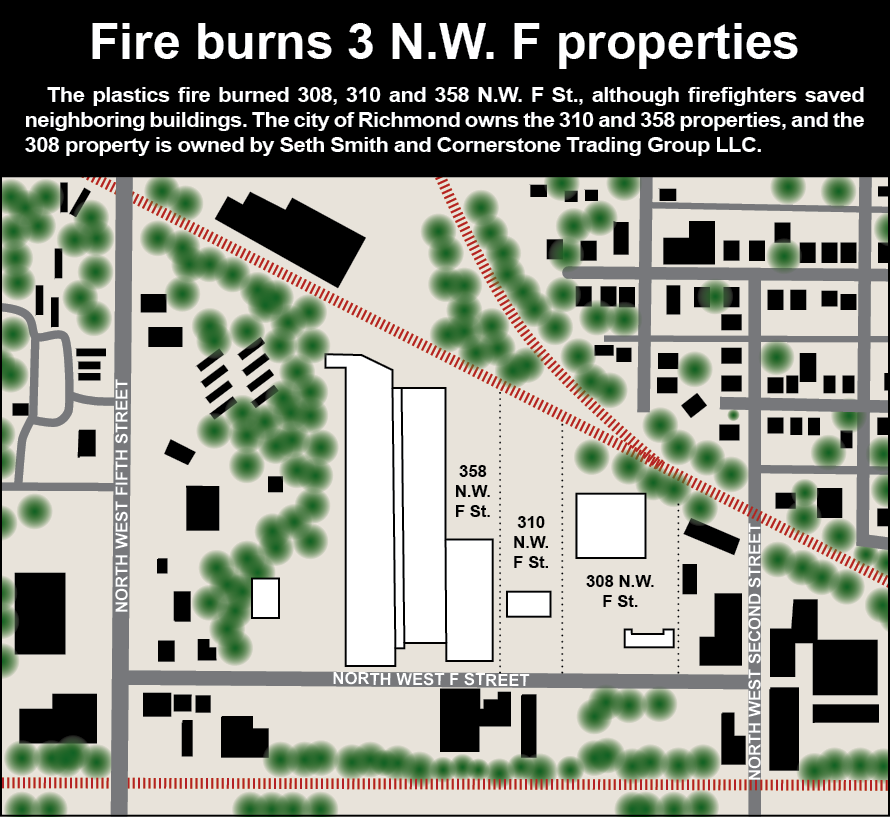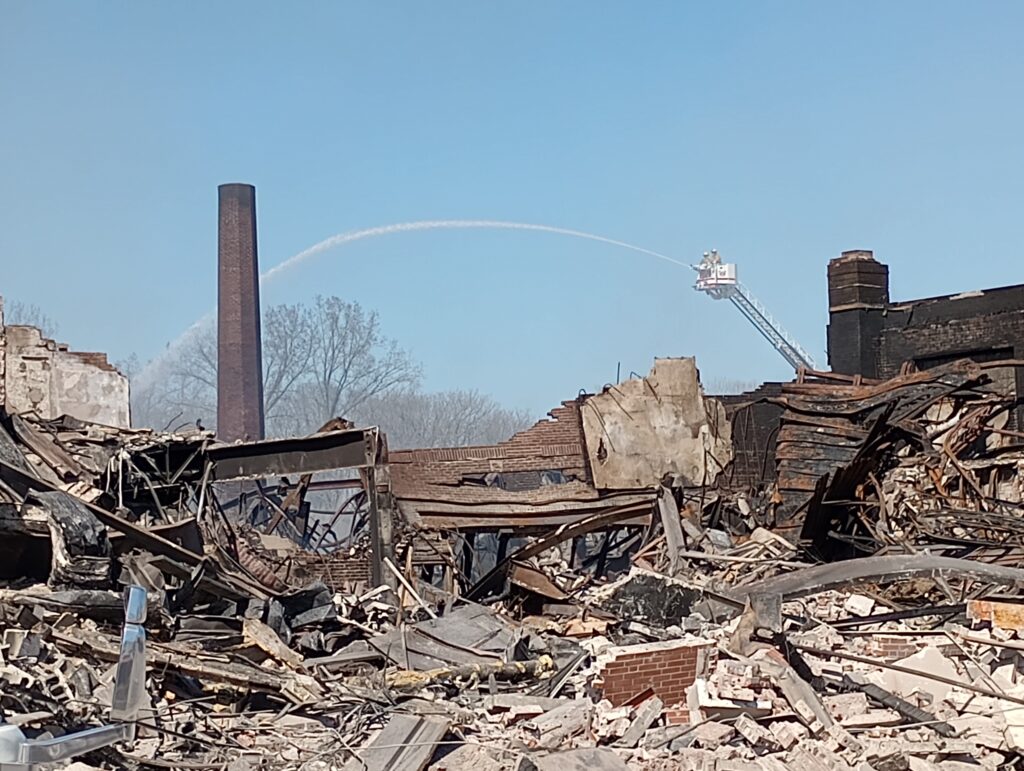“It’s his fault.”
Mayor Dave Snow blames Seth Smith, owner of Cornerstone Trading Group LLC, for hazardous conditions at a three-property complex that burned for more than three days last week. Smith stored tons of plastics in six buildings that total nearly 255,000 square feet on the 13.8-acre complex.
Government officials recognized the properties as a fire hazard four years ago. The city’s Unsafe Building Commission issued Smith orders to demolish, repair or vacate the properties in 2019 that were affirmed by a judge when Smith challenged the UBC orders. In the ensuing years, including two since the city acquired ownership of two of the three properties, the city forced Smith to make some cleanup progress.
However, the properties at 308, 310 and 358 N.W. F St. remained enough of a hazard for Richmond Fire Department Chief Tim Brown to say it was a matter of “not if, but when” a fire such as last week’s would occur.
Snow said Smith ignored the cleanup orders. The city lacked legal remedy to force his compliance and faced a multimillion-dollar price tag to clean the mess up itself, Snow said.
“I’m not going to throw other branches of government under the bus when the reality is we have someone here who was negligent and irresponsible and put a lot of people in danger,” Snow said. “And there is no reason to point fingers and make this anyone else’s fault but his.”
Snow and A.J. Sickmann, the city’s attorney, said Smith was contacted during last week’s initial fire investigation. They characterized his response as anticipating a visit from the city and referring the city’s inquiries to legal counsel.
The Western Wayne News attempted to reach Smith for comment through a voicemail message left at a number listed for Cornerstone Trading Group, but had not received a response as of press time.
Documents related to the Unsafe Building and former Circuit Court Judge David Kolger’s orders show that Smith operated My Way Trading Inc. as a plastics recycling and resale business. However, he became ill during 2015 and inventory piled up during his absence, forcing him to file for bankruptcy. Smith got the business back on track during March 2018, now as Cornerstone, but admitted in testimony that the plastics storage “got out of control.”
Of the three properties, Smith only owned 308 N.W. F St. He had possession and control of the other two properties by storing plastics inside and outside buildings. Smith said he was working toward deeded ownership from listed owner AFG Investment Fund, a company with a California address that had its Indiana business status revoked on June 20, 2008, according to Indiana Secretary of State records.
During 2019, the city inspected the three properties and took Smith before the Unsafe Building Commission, noting among other violations that the properties were fire hazards. Smith said he shipped plastics from 350 customers to 29 countries, and moved 30 million pounds of plastics during 2018 and had shipped 55 million by that point in 2019. When the UBC issued its orders against Smith, he said he had 12 million pounds of plastics alone in a nearly 216,000-square-foot building at 358 N.W. F St., the former Hoffco site.
The UBC orders included repairing structural components of buildings, clearing access and fire lanes, installing fire detection and suppression equipment, removing materials to a level that meets code, meeting signage and fire prevention codes and complying with emergency lighting codes. Smith was provided 60 days, a timeline he said was unrealistic.
When Smith appealed, Kolger, who has since retired, affirmed the UBC’s orders, ruling the structures were clearly unsafe, presented a fire hazard, were a hazard to public health, were a nuisance and were dangerous to people or property.
“The Unsafe Building order and the court order affirming that order continue to stand, so responsibility remains with the person that created the problem,” Sickmann said last week. “From a pragmatic perspective, the city’s obviously involved and going to be cleaning this up. We’re not going to let it sit in that state. It’s going to be a process, but there will be an accountability component to this on the back end that we’ll look at after we get through the process.”
By 2020, delinquent property taxes and fines for the 310 and 358 properties totaled $601,873.25, qualifying the properties for a county deed sale. The city asked the Wayne County Board of Commissioners to assume ownership of those properties, which comprise 11.319 acres. The city is recorded in county records as taking ownership March 22, 2021, from the commissioners.
“We saw an opportunity to secure two of the parcels through a tax sale process to eliminate interference from the business owner, and then we began the process of securing an EPA grant to help identify and categorize the materials,” Sickmann said. “After that, we entered into an agreement with the business owner that would provide him the ability to remove these materials and sell them.”
Sickmann said the city monitored Smith and restricted him to only moving plastics from the complex, not adding new plastics to the location. Smith was moving truckloads out, Sickmann said, but with a softer overseas plastics market, progress was slow. Because the undertaking was so massive, the city only established an “as soon as possible” deadline for Smith, Sickmann said.
Property owners abandoning properties or ignoring cleanup orders is not new or particularly rare. The city routinely contracts out cleanup work for residences through its Board of Public Works and Safety, but those contracts often cost fewer than $1,000. The city and county recently split $30,384 in cleanup costs for abandoned mobile homes on a property owned by out-of-state Palm Harbor Villages at the corner of U.S. 35 and Salisbury Road. More similarly to the plastics problem, the city, county and Reid Health contributed to cover the $3,461,350 bid award for demolition of the former Reid Hospital.
“This was a multi-million-dollar undertaking, and for a city government to redirect millions of dollars away from city services and into cleaning up someone else’s mess is not a precedent we should ever set,” Snow said. “He was made very aware through various processes that this is his mess. He has a court order, and he disregarded these orders. He left the mess in place and everyone’s worst fears came to light, and he is responsible for this.”
Cost was just one factor in a possible city cleanup. The scope of clearing away the plastics would be incredibly large, beyond city capability; the plastics need a place or places for disposal, something Smith could provide with his overseas buyers; and First Bank Richmond had a security interest on the plastics inventory as loan collateral.
“We would have been taking materials technically owned by the bank,” Sickmann said, adding there was a process with the bank to try and resolve the issue.
Now, the city faces costs associated with both the fire and the site’s cleanup. Snow said the city is tracking those costs to hold Smith responsible.
“If we are moving into future litigation in this, we are tracking all of those costs for that reason,” Snow said.
A version of this article appeared in the April 19 2023 print edition of the Western Wayne News.


